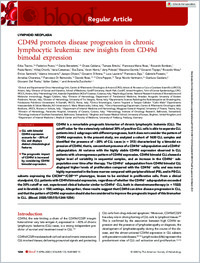CD49d promotes disease progression in chronic lymphocytic leukemia : new insights from CD49d bimodal expression
- Tissino, Erika Clinical and Experimental Onco-Hematology Unit, Centro di Riferimento Oncologico di Aviano (CRO), Istituto di Ricovero e Cura a Carattere Scientifico (IRCCS), Italy
- Pozzo, Federico Clinical and Experimental Onco-Hematology Unit, Centro di Riferimento Oncologico di Aviano (CRO), Istituto di Ricovero e Cura a Carattere Scientifico (IRCCS), Italy
- Benedetti, Dania Clinical and Experimental Onco-Hematology Unit, Centro di Riferimento Oncologico di Aviano (CRO), Istituto di Ricovero e Cura a Carattere Scientifico (IRCCS), Italy
- Caldana, Chiara Clinical and Experimental Onco-Hematology Unit, Centro di Riferimento Oncologico di Aviano (CRO), Istituto di Ricovero e Cura a Carattere Scientifico (IRCCS), Italy
- Bittolo, Tamara Clinical and Experimental Onco-Hematology Unit, Centro di Riferimento Oncologico di Aviano (CRO), Istituto di Ricovero e Cura a Carattere Scientifico (IRCCS), Italy
- Rossi, Francesca Maria Clinical and Experimental Onco-Hematology Unit, Centro di Riferimento Oncologico di Aviano (CRO), Istituto di Ricovero e Cura a Carattere Scientifico (IRCCS), Italy
- Bomben, Riccardo Clinical and Experimental Onco-Hematology Unit, Centro di Riferimento Oncologico di Aviano (CRO), Istituto di Ricovero e Cura a Carattere Scientifico (IRCCS), Italy
- Nanni, Paola Clinical and Experimental Onco-Hematology Unit, Centro di Riferimento Oncologico di Aviano (CRO), Istituto di Ricovero e Cura a Carattere Scientifico (IRCCS), Italy
- Chivilò, Hillarj Clinical and Experimental Onco-Hematology Unit, Centro di Riferimento Oncologico di Aviano (CRO), Istituto di Ricovero e Cura a Carattere Scientifico (IRCCS), Italy
- Cattarossi, Ilaria Clinical and Experimental Onco-Hematology Unit, Centro di Riferimento Oncologico di Aviano (CRO), Istituto di Ricovero e Cura a Carattere Scientifico (IRCCS), Italy
- Zaina, Eva Clinical and Experimental Onco-Hematology Unit, Centro di Riferimento Oncologico di Aviano (CRO), Istituto di Ricovero e Cura a Carattere Scientifico (IRCCS), Italy
- Norris, Kevin Division of Cancer and Genetics, School of Medicine, Cardiff University, United Kingdom
- Polesel, Jerry Unit of Cancer Epidemiology, CRO, IRCCS, Aviano, Italy
- Gentile, Massimo Hematology Unit, Azienda Ospedaliera (AO) of Cosenza, Italy
- Tripepi, Giovanni Nephrology Center, National Research Institute of Biomedicine and Molecular Immunology, Reggio Calabria, Italy
- Moia, Riccardo Division of Hematology, Department of Translational Medicine, Amedeo Avogadro University of Eastern Piedmont, Novara, Italy
- Santinelli, Enrico Division of Hematology, University of Tor Vergata, Rome, Italy
- Innocenti, Idanna Dipartimento Scienze Radiologiche Radioterapiche ed Ematologiche, Fondazione Policlinico Universitario A Gemelli, IRCCS, Rome, Italy
- Olivieri, Jacopo Clinica Ematologica, Centro Trapianti e Terapie Cellulari “Carlo Melzi” Dipartimento Interaziendale di Salute Mentale, AO Universitaria S. Maria Misericordia, Udine, Italy
- D’Arena, Giovanni Onco-Haematology Department, Centro di Riferimento Oncologico della Basilicata, IRCCS, Rionero in Vulture, Italy
- Laurenti, Luca Dipartimento Scienze Radiologiche Radioterapiche ed Ematologiche, Fondazione Policlinico Universitario A Gemelli, IRCCS, Rome, Italy
- Zaja, Francesco Department of Internal Medicine and Hematology, Maggiore General Hospital, University of Trieste, Italy
- Pozzato, Gabriele Department of Internal Medicine and Hematology, Maggiore General Hospital, University of Trieste, Italy
- Chiarenza, Annalisa Division of Hematology, Ferrarotto Hospital, University of Catania, Italy
- Di Raimondo, Francesco Division of Hematology, Ferrarotto Hospital, University of Catania, Italy
- Rossi, Davide Hematology, Institute of Oncology Research (IOR), Faculty of Biomedical Sciences, Università della Svizzera italiana, Switzerland - Oncology Institute of Southern Switzerland (IOSI), Bellinzona, Switzerland
- Pepper, Chris Brighton and Sussex Medical School, University of Sussex, Brighton, United Kingdom
- Hartmann, Tanja Nicole Department of Internal Medicine I, Medical Center and Faculty of Medicine, University of Freiburg, Germany
- Gaidano, Gianluca Division of Hematology, Department of Translational Medicine, Amedeo Avogadro University of Eastern Piedmont, Novara, Italy
- Del Poeta, Giovanni Division of Hematology, University of Tor Vergata, Rome, Italy
- Gattei, Valter Clinical and Experimental Onco-Hematology Unit, Centro di Riferimento Oncologico di Aviano (CRO), Istituto di Ricovero e Cura a Carattere Scientifico (IRCCS), Italy
- Zucchetto, Antonella Clinical and Experimental Onco-Hematology Unit, Centro di Riferimento Oncologico di Aviano (CRO), Istituto di Ricovero e Cura a Carattere Scientifico (IRCCS), Italy
-
31.01.2020
Published in:
- Blood. - 2020, vol. 135, no. 15, p. 1244–1254
Lymphoid neoplasia
Chronic b-cell leukemias
Chronic lymphocytic leukemia
Disease progression
Ibrutinib
Prognostic marker
Cxcr4 receptors
Homogeneity
English
CD49d is a remarkable prognostic biomarker of chronic lymphocytic leukemia (CLL). The cutoff value for the extensively validated 30% of positive CLL cells is able to separate CLL patients into 2 subgroups with different prognoses, but it does not consider the pattern of CD49d expression. In the present study, we analyzed a cohort of 1630 CLL samples and identified the presence of ∼20% of CLL cases (n = 313) characterized by a bimodal expression of CD49d, that is, concomitant presence of a CD49d+ subpopulation and a CD49d− subpopulation. At variance with the highly stable CD49d expression observed in CLL patients with a homogeneous pattern of CD49d expression, CD49d bimodal CLL showed a higher level of variability in sequential samples, and an increase in the CD49d+ subpopulation over time after therapy. The CD49d+ subpopulation from CD49d bimodal CLL displayed higher levels of proliferation compared with the CD49d− cells; and was more highly represented in the bone marrow compared with peripheral blood (PB), and in PB CLL subsets expressing the CXCR4dim/CD5bright phenotype, known to be enriched in proliferative cells. From a clinical standpoint, CLL patients with CD49d bimodal expression, regardless of whether the CD49d+ subpopulation exceeded the 30% cutoff or not, experienced clinical behavior similar to CD49d+ CLL, both in chemoimmunotherapy (n = 1522) and in ibrutinib (n = 158) settings. Altogether, these results suggest that CD49d can drive disease progression in CLL, and that the pattern of CD49d expression should also be considered to improve the prognostic impact of this biomarker in CLL.
- Language
-
- English
- Classification
- Medicine
- License
-
License undefined
- Open access status
- green
- Identifiers
-
- RERO DOC 330252
- DOI 10.1182/blood.2019003179
- ARK ark:/12658/srd1319179
- Persistent URL
- https://n2t.net/ark:/12658/srd1319179
Statistics
Document views: 232
File downloads:
- Fulltext: 275
